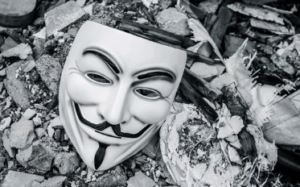The collective known as Anonymous has garnered considerable attention for its activities in the realm of hacktivism and online protests. With a decentralized structure and a commitment to promoting political and social change, some have praised their actions, while others have decried them as criminal. In this article, we will explore the question of whether Anonymous hackers are criminals and examine the complexities surrounding this label.

The Anonymous Collective
Anonymous operates as a loosely organized collective of individuals who share common ideologies and interests. These members are often drawn together through online forums and social media, using pseudonyms and digital masks to conceal their identities. The collective’s decentralized structure makes it challenging for authorities to pinpoint individual members or a central leadership.
Hacktivism vs. Cybercrime
A key distinction must be made between hacktivism and cybercrime. Hacktivism is the act of using hacking techniques for political or social activism, typically with the aim of promoting change, exposing injustice, or advocating for a particular cause. In contrast, cybercrime encompasses a range of illicit activities conducted online, such as hacking for personal gain, identity theft, fraud, and data breaches. The question of whether Anonymous hackers are criminals hinges on the nature and intent of their actions.
Hacktivist Actions
Anonymous has been involved in numerous hacktivist actions over the years. These actions often revolve around political causes, government transparency, freedom of speech, and social justice. Some of their notable activities include distributed denial-of-service (DDoS) attacks on websites, leaks of sensitive information, and online protests.
In some cases, Anonymous has targeted organizations and institutions they perceive as oppressive or corrupt, such as government agencies, corporations, and entities associated with censorship. Their actions are driven by a commitment to principles of transparency, accountability, and freedom of information.
Legal Complexities
Determining whether Anonymous hackers are criminals involves navigating a web of legal complexities:
-
Ambiguity of Legal Frameworks: Hacktivism often falls into a legal gray area. While some hacktivist activities may be unlawful, they may not fit neatly into existing legal frameworks designed to address cybercrime. This ambiguity can make it challenging for authorities to pursue legal action.
-
Varied Intent: The intent behind hacktivist actions is a crucial factor in determining whether they are criminal. Some hacktivists aim to create change and challenge perceived wrongdoing, while others may engage in cybercrimes for personal gain or malicious purposes. Intent is not always easy to discern.
-
Ethical Dilemmas: Some individuals, including law enforcement professionals and legal experts, view hacktivism as a form of civil disobedience or a response to government or corporate overreach. The ethics of these actions may be debated, and this debate influences how they are perceived legally.
-
Legal Jurisdictions: Anonymous operates internationally, and the enforcement of laws varies from one jurisdiction to another. This creates additional challenges in pursuing legal action against individuals involved in hacktivist activities.
Previous Legal Action
Various individuals associated with Anonymous have faced legal consequences for their actions. Some high-profile cases include:
-
Operation Payback: In 2013, several individuals associated with Anonymous were arrested and charged for their participation in distributed denial-of-service (DDoS) attacks as part of Operation Payback, a campaign against organizations and institutions they saw as adversaries of internet freedom.
-
The Stratfor Hack: In 2012, Jeremy Hammond, affiliated with Anonymous, was arrested and later sentenced to 10 years in prison for hacking into the private intelligence firm Stratfor and leaking sensitive information.
-
The Sabu Case: Hector Monsegur, a key member of LulzSec, cooperated with the FBI after his arrest in 2011. His cooperation led to the arrests and convictions of several other members of LulzSec and Anonymous.
Public Opinion and Hacktivism
Public opinion on hacktivism varies widely. Some view hacktivism as a means of holding powerful institutions accountable and advocating for transparency, human rights, and civil liberties. Others consider hacktivist actions as illegal, disruptive, and harmful.
It’s important to note that hacktivist actions have often exposed wrongdoing, fostered discussion on critical issues, and led to reforms or changes in policy. For example, Anonymous played a role in supporting activists during the Arab Spring and the Occupy Wall Street movement, providing technical support and amplifying their voices.
Conclusion
The question of whether Anonymous hackers are criminals is a nuanced one. While some activities associated with the collective may indeed cross legal boundaries, the intent behind these actions and the ethical debate surrounding hacktivism cannot be overlooked. Hacktivism exists in a gray area between political activism and cybercrime, and public opinion on this issue is divided.
As technology and legal frameworks evolve, the distinction between hacktivism and cybercrime may become clearer. Until then, determining the legality of Anonymous hackers’ actions will continue to be a complex and multifaceted issue, with perspectives varying among law enforcement, the legal system, and the general public.